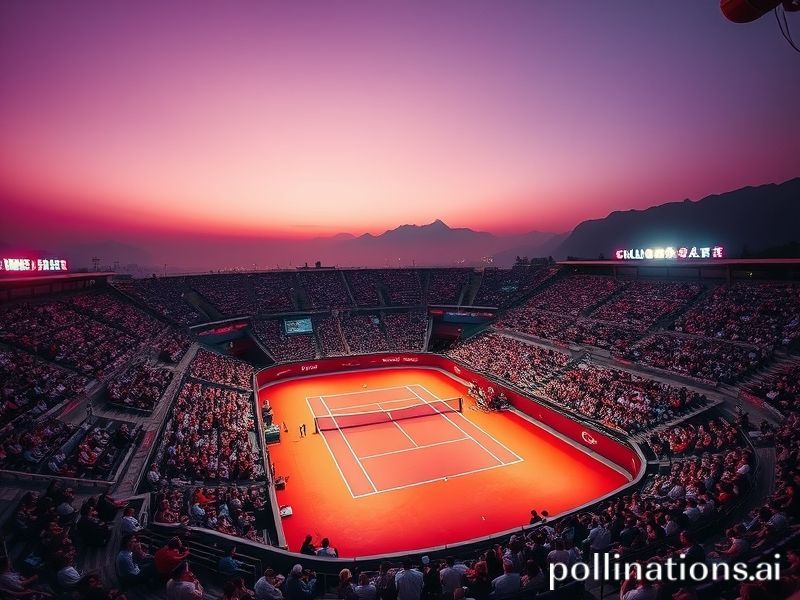Chengdu Open: Where Tennis Serves as the World’s Most Expensive Distraction
Chengdu Open: A Tennis Tournament, a Power Cable, and the World’s Slow-Motion Nervous Breakdown
By Dave’s Far-East Correspondent, Nursing a Hangzhou Hangover
The Chengdu Open—an ATP 250 event played 1,600 kilometres from the nearest ocean and zero kilometres from the next Sichuan hotpot—kicked off this week in a city best known for pandas who refuse to breed and citizens who’ve perfected the art of appearing relaxed while living under 24-hour facial recognition. On paper it’s just another stop on the men’s tour calendar, a post-US-Open palate cleanser before the European indoor swing. In practice, it’s a tidy little metaphor for the planet’s current operating system: flashy LED scoreboards powered by coal plants nobody wants to acknowledge, polite applause muffled by the polite smog, and everyone pretending the geopolitical fault lines under their sneakers aren’t vibrating at match point.
Global broadcasters dutifully shipped in commentators who pronounced “Sichuan” three different ways, none correctly, while reminding viewers that Chengdu is “the gateway to Western China”—a phrase that sounds like brochure poetry until you remember Western China is also the address for several re-education camps and a couple of missile silos. Still, the tennis must go on. Nothing says “business as usual” quite like two millionaires swatting a fuzzy yellow sphere as drones overhead practice loitering munitions drills in the next province.
The draw this year features the usual suspects: a moody Russian who’s probably banned from Centre Court, a Canadian who apologised for winning, and a Chinese wildcard whose ranking is closer to the price of a Beijing parking ticket than to the top hundred. They play inside the Sichuan International Tennis Centre, a brutalist donut the colour of wet concrete that seats 6,000 humans and, if you believe local whispers, one very bored panda on loan from the research base next door. Between points you can almost hear the animal wondering why evolution didn’t bless it with opposable thumbs and a kick-serve.
Financially, the tournament is a Rorschach test. The prize purse—just over a million USD—could cover roughly four minutes of global arms spending, or, more optimistically, twelve minutes of Mark Zuckerberg’s therapy. Title sponsors rotate between a state-run liquor conglomerate and an EV battery maker that denies any connection to the Uyghur region while its supply chain visibly twitches. Luxury-box tickets come with complimentary earplugs for when the fighter jets from the nearby airbase do their unscheduled flyovers—China’s version of the kiss-cam, only louder and more existential.
For the players, Chengdu is a study in cognitive dissonance. One minute you’re signing oversized checks for children who’ve been taught to smile for foreign cameras; the next you’re scrolling Twitter (via VPN, naturally) to discover your home government just sanctioned half the tournament’s ball kids. Coaches carry two phones: one for coaching analytics, one for plausible deniability. In the locker room, conversations pivot from string tension to which consulate still answers after 6 p.m. Everyone agrees the hotpot is sensational; nobody agrees what “sensational” might cost five years from now.
And yet the crowds come, armed with selfie sticks and an admirable tolerance for queuing. They cheer loudest for the underdog, perhaps sensing kinship with anyone ranked 189th in a system stacked against them. Between rallies they discuss housing prices the way other nations discuss weather—i.e., catastrophically. You half-expect the umpire to announce, “Quiet please, the middle class is serving.”
In the broader scheme, the Chengdu Open is a reminder that globalisation never died; it just got weirder. Supply chains, sports chains, food chains—all braided together in a spicy broth of commerce and surveillance. Every cross-court winner echoes across a planet simultaneously more connected and more paranoid than ever. If the tournament has a moral, it’s that we can still ship athletes, broadcast signals, and carbon emissions across borders faster than we can ship basic human empathy. The pandas, for their part, remain unmoved; they’ve seen this rally before and know how it ends—in extra sets nobody asked for, with tiebreaks decided by whoever blinks at the geopolitical net.
When the final ball is struck and the trophy lifted (a silver monstrosity shaped like a teardrop or maybe a surveillance satellite), the nets will be rolled up, the LED boards dimmed, and the city will return to its usual business of pretending tomorrow won’t require another VPN update. Somewhere, a panda will yawn, the smog will thicken, and the world will spin on—its rotation slightly altered by yet another minor tournament that, for a fleeting week, let us pretend the game mattered more than the arena.







